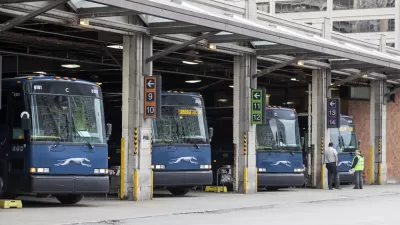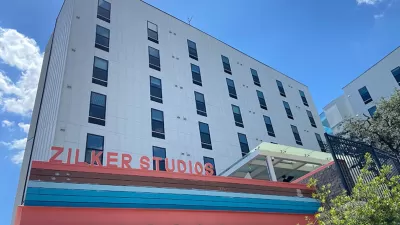A new report shows that low-carbon development policies can help to achieve numerous planning goals including job creation, improved safety and public health, social inclusion, and improved accessibility.

A new report, "The Economic and Social Benefits of Low-Carbon Cities: A Systematic Review of the Evidence," by University of Leeds researchers for the New Climate Economy's Coalition for Urban Transitions, examines the economic case for climate action through more resource-efficient urban planning. This comprehensive review shows that low-carbon measures can help to achieve a range of development priorities, such as job creation, improved safety and public health, social inclusion, and improved accessibility.
Co-benefits include:
- Congestion pricing has been found to reduce traffic, travel times, and congestion 10–30% (Section 2.2).
- Policies which promote liveable density have been shown to increase urban productivity by 3% for every doubling of urban density (Section 2.3.1).
- Public transport networks can reduce transport-related injuries by up to 80% (Section 2.1.5), create direct and indirect employment (Section 2.3.2), and improve public health (Sections 2.2.1, 2.2.2, and 2.1.4).
- Health benefits from dedicated cycle lanes vary from €0.30-1.20 per km (Section 2.1.4).
- Pedestrianisation produces health benefits several times larger than cost of investments (Section 2.1.4).
This evidence suggests that the benefits of these low-carbon measures extend far beyond emission reductions. The wider economic, social, and environmental impacts may be much more valuable than the financial returns associated with climate action. This bundle of measures could therefore provide a platform for more transformative change by building public enthusiasm for low-carbon urban development, as well as the institutional capacities, financing arrangements, and learning needed for more ambitious action.
FULL STORY: The Economic and Social Benefits of Low-Carbon Cities: A Systematic Review of the Evidence

Alabama: Trump Terminates Settlements for Black Communities Harmed By Raw Sewage
Trump deemed the landmark civil rights agreement “illegal DEI and environmental justice policy.”

Planetizen Federal Action Tracker
A weekly monitor of how Trump’s orders and actions are impacting planners and planning in America.

Why Should We Subsidize Public Transportation?
Many public transit agencies face financial stress due to rising costs, declining fare revenue, and declining subsidies. Transit advocates must provide a strong business case for increasing public transit funding.

Understanding Road Diets
An explainer from Momentum highlights the advantages of reducing vehicle lanes in favor of more bike, transit, and pedestrian infrastructure.

New California Law Regulates Warehouse Pollution
A new law tightens building and emissions regulations for large distribution warehouses to mitigate air pollution and traffic in surrounding communities.

Phoenix Announces Opening Date for Light Rail Extension
The South Central extension will connect South Phoenix to downtown and other major hubs starting on June 7.
Urban Design for Planners 1: Software Tools
This six-course series explores essential urban design concepts using open source software and equips planners with the tools they need to participate fully in the urban design process.
Planning for Universal Design
Learn the tools for implementing Universal Design in planning regulations.
Caltrans
Smith Gee Studio
Institute for Housing and Urban Development Studies (IHS)
City of Grandview
Harvard GSD Executive Education
Toledo-Lucas County Plan Commissions
Salt Lake City
NYU Wagner Graduate School of Public Service




























